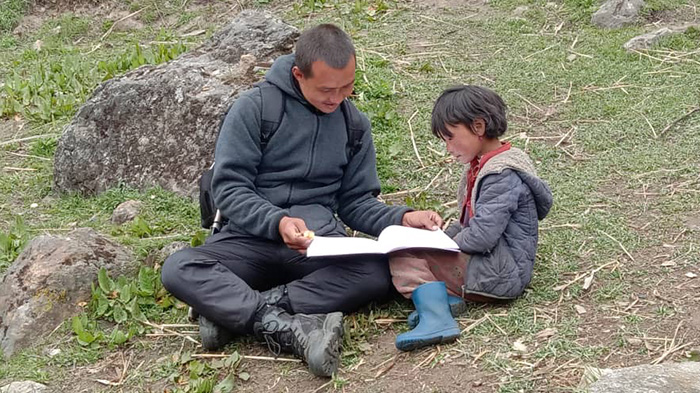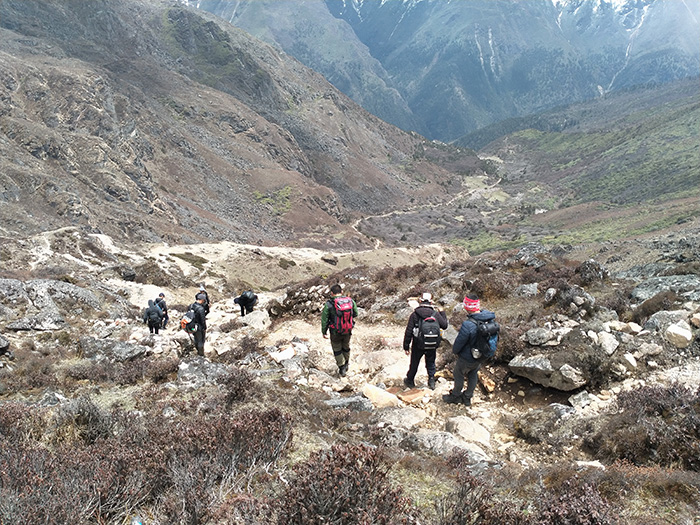Yangchen C Rinzin
Students in Mendrelthang Extended Classroom (ECR) in Lunana have become busier since May 5. Since ECR was closed, students without television had missed out the tele-education broadcast on Bhutan Broadcasting Services (BBS) TV every day.
Students had to rely on the teacher to keep them engaged using social media applications where they were made to do activities using textbooks. For many parents, it was difficult with poor internet or high data charges.
But the students do not have to worry anymore.
The students, 15 of them, now have Self Instructional Materials (SIM) with them. The teacher, Namgay Dorji dropped the materials, which was reached to Lunana using a chopper service, to each student.
Namgay Dorji now visits the students at least once in three days and teaches them using the SIM.
“I try to guide them, as we are required to do so. Sometimes students study on their own and send me a picture of the lessons through Wechat App if they don’t understand,” he said.
Like him, other teachers in Lunana gewog has been going door to door reaching out the SIM and teaching students. Phub Gyeltshen of Lunana Primary School had just returned from Wachey village, a day’s walk from Lunana, after dropping the SIM and instructing the students.
“We have to walk through snow covered passes and cover the whole lesson using the SIM before returning,” he said. “We plan to go to other villages that are more than three days’ walk and are completely cut off from television or the internet.”

A teacher helps a Lunana student with the SIM (Photo: Phub Gyeltshen)
The education ministry has distributed its first package of SIM to all the 20 dzongkhags. Teachers and dzongkhag education officers have been busy distributing the SIM and making students make use of it.
The ministry came up with the SIM, a printed version of the tele-education to engage students that do not have access to television or the internet.
SIM is the printed version of the same lessons that were covered for classes PP to XII and aired through the BBS TV. The study materials would be reached to the 17,000 students the ministry found had no access to television or internet services.
However, during distribution, it was found that there were more than the estimated students who needed SIM. It is estimated that 9,000 additional students would require SIM.
Officiating Secretary, Karma Tshering told Kuensel the earlier list was collected only based on the student who did not have access to television or internet. He said later it was realised that although some students had access to television, they did not have the BBS channel. The new list also includes students who have smartphones but without functional internet connectivity.
“We’ll be printing additional SIM and distribute to all the students who did not get,” Karma Tshering said. SIM is also uploaded on the education ministry’s website.
Although teachers are trying to reach out to students, some of the teachers in remote schools said that it was difficult to follow up, as some students are isolated by distance. Some of the dzongkhags are yet to receive the materials.
Karma Tshering said that teachers must help students learn with the help of SIM because this is what the objective is, to reach out to the unreached students. “Teachers could go and spend few days with these students and then go to the rest.”
However, he said that if teachers are unavailable, any literate people in the village or non-formal education instructors, community centre operators or ECCD facilitators could also help students learn.
SIM was piloted in different dzongkhags where 85 percent of the children responded that they were able to understand lessons in the SIM. The ministry has spent about Nu 4 million (M) for SIM and about Nu 1M for radio.
“This is cost recovery,” Karma Tshering said. “About 14,000 students, parents and teachers have responded to a survey on tele-education and 75 percent expressed satisfaction with the lessons broadcast on TV.”
However, since there were few glitches and issues shared by people like poor presentation and unclear lesson concepts, the recorded lesson videos are being improved by re-recording according to the officiating secretary.
A total of 440 lessons were recorded, of which about 280 episodes were broadcast as of May 8.


